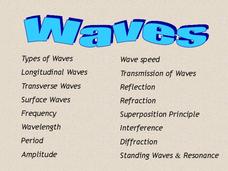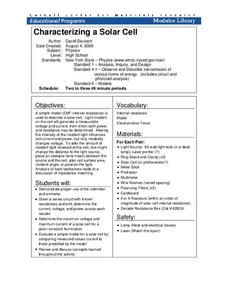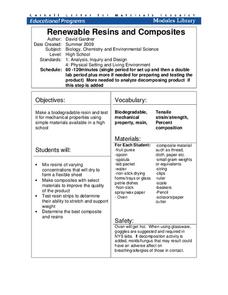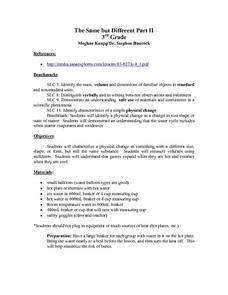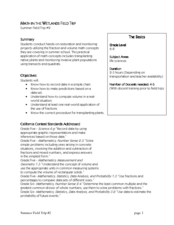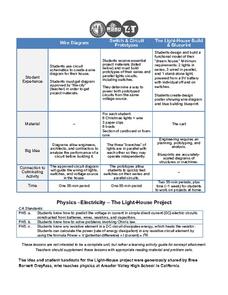Curated OER
# 03 Laboratory Ventilation and Risk Assessment Exercise
Students are introduced to the analysis of health risks in the laboratory, particularly from vapors from organic solvents. They consider quantitative measure of risk such as threshold limit values (TLVs), the amount of the compound that...
Curated OER
Sunrise/Sunset
Third graders discovver what causes the dramatic colors of a sunset by seeing the changing color of light as it passes through a clear container of water to which milk is gradually added. They measure the liquids and observe what happens...
Curated OER
It's Natural!
Here's a nicely designed learning exercise that will allow your young scientists to learn about common materials and products that come from nature. They also looks at synthesized products that come from a factory. This simple matching...
California Academy of Science
What Would Happen?
Nothing says classroom fun like an invertebrate and a magnifying glass! Snails, earthworms, and roly-poly bugs become the center of attention as pint-sized investigators hone their inquiry and observation skills. They are guided through...
Curated OER
Waves
Although this was written to accompany a specific textbook, the information can illustrate wave motion for any advanced level physics course. The slides are simple, use plain but colorful fonts, and include diagrams and pictures to...
University of California
You Are What You Eat: Testing for Organic Compounds in Foods
We have all heard that we are what you eat, but what are we eating? An informative lesson opens with a discussion of the foods pupils have recently eaten. Then, young scientists perform four experiments on seven different foods to...
Cornell University
Characterizing a Solar Cell
Young classes are sure to get a charge out of this instructional activity! Learners experiment with circuits of a solar cell. They practice determining current, voltage, and power for the circuit and maximize the voltage and current of...
Exploratorium
Take It From the Top
Experiment with the center of gravity by stacking blocks in a way that appears to defy its force. This is a fascinating demonstration that you can use when teaching about gravity, forces, or balance.
Exploratorium
Seeing Your Blind Spot
Viewers use a small, dimmed flashlight to identify the blind spot for both the right and left eye. It is a simple activity to incorporate into your activities during a lesson on vision and the structure and function of the eyeball.
Cornell University
Polymers: Making Silly Putty
Putty is proof that learning can be fun! Share the wonderful world of polymers with your class through an experiment. Young scientists create their own silly putty, then examine its properties.
Cornell University
Renewable Resins and Composites
Merge chemistry with environmental science to study biodegradable materials. An engaging activity allows learners to experiment with different resin concentrations and composites. Through experimental tests, scholars test their creations...
Curated OER
The Same, But Different Part II
Learners characterize a physical change as something that changes to a different size, but retains its basic substance. They measure volumes using milliliters, and perform an experiment that proves that gases expand when hot and contract...
Curated OER
Antibiotic Resistance
High schoolers conduct an experiment to examine the effects of six different antibiotics on two different types of bacteria. They monitor Petri dishes with bacterial cultures and antibiotic soaked disks. They relate the bacteria growth...
Curated OER
Math in the Wetlands Field Trip
Get your class out in the environment for hands on math activities. In this wetlands lesson, learners transplant native plants, calculate how much soil is needed, and perform math activities based on this experience. They then make...
National Institute of Food and Agriculture
Water Pollution Demonstration
Water pollution is everywhere, and pollutants range from oil to fertilizers. Bring the concept to life by demonstrating the difficulties in getting particular pollutants out of water.
American Museum of Natural History
See the Light
It's time to see the light! Scholars perform three different experiments with light to reveal properties using a great remote learning resource. The pupils see how light reflects from a surface and refracts through different materials....
Curated OER
Changes in Nature
The goal of this science lesson is to have youngsters be able to identify the physical and chemical changes in the carbon cycle, and water cycle due to weathering. The in-class inquiry/experiment is quite interesting and easy to...
Curated OER
Busted Bubbles
Using the scientific method, and bubble gum, learners conduct a motivating experiment. After conducting a series of tests involving bubble gum, they graph and analyze their results. This is the type of activity everyone loves.
Trash For Teaching
The Light-House Project
Groups work together to design a lighthouse, from designing and drawing the wiring diagram, to creating prototypes of the switch and circuit, to envisioning and building a scale model along with a blueprint. By including different...
It's About Time
Response Time
How fast are your reactions in the case of an emergency? Young scholars complete many activities including: time estimation, building a circuit, multiple reaction time experiments, and graphing.
Centers for Disease Control and Prevention
Understanding the Epidemiologic Triangle through Infectious Disease
Introduce infectious diseases and the epidemiologic triangle. A helpful resource describes the agent, host, and environment from the three vertices as well as the time factor, which is in the middle. Scholars complete a simple...
Curated OER
Be "Sun-sible" about Heating Water
Students create a solar water heater. In this solar energy lesson, students conduct an experiment to determine which colors absorb more radiant heat. Students investigate the relationship of heat loss to insulation. Students then create...
Polar Trec
Family Polar Fun Day
Family fun days are great for connecting home and school life, building strong parent/teacher relationships, and engaging students in a fun and social way. Here are several activity ideas to help you and your class run your own Family...
It's About Time
Detect and Induce Currents
Young scientists recreate an 1820 experiment and build off of it to investigate how to detect and induce electrical currents. As a final activity, scholars answer questions in multiple formats.






